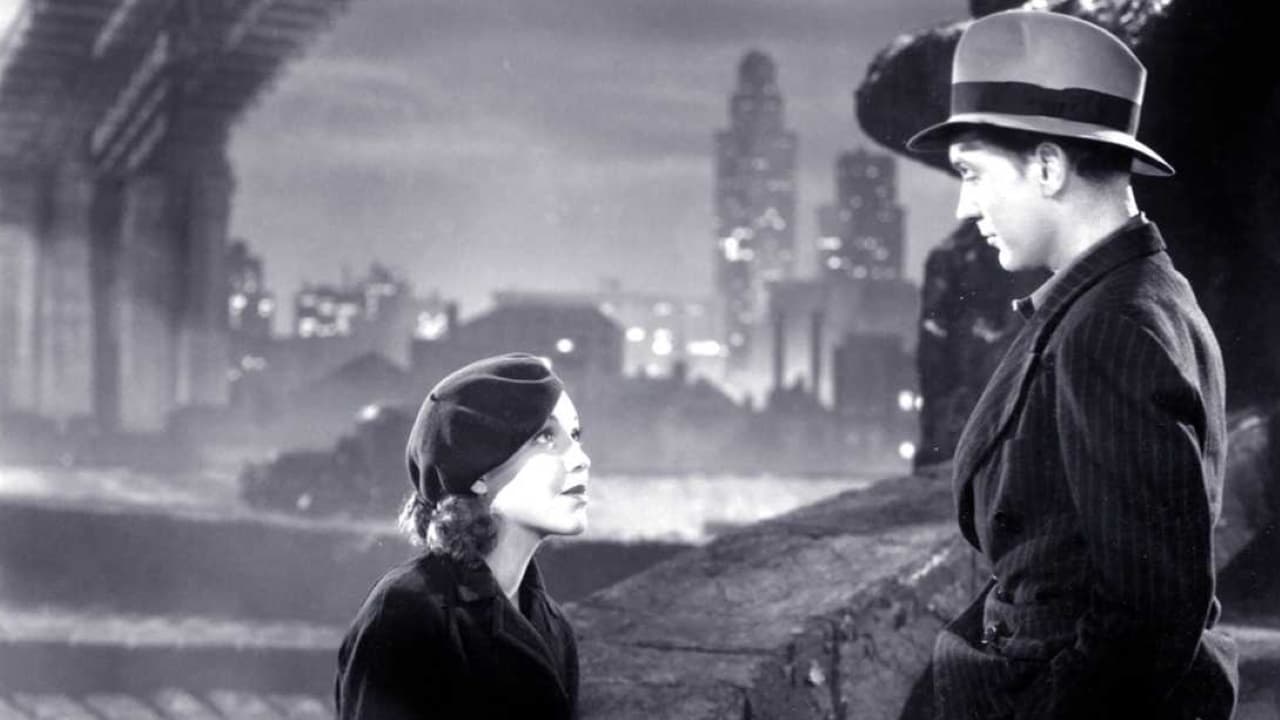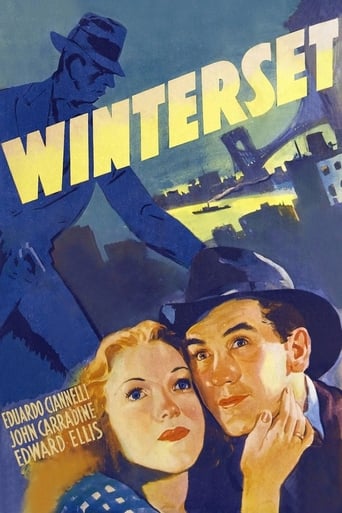

Memorable, crazy movie
... View MoreThe acting is good, and the firecracker script has some excellent ideas.
... View MoreThis is a gorgeous movie made by a gorgeous spirit.
... View MoreStrong acting helps the film overcome an uncertain premise and create characters that hold our attention absolutely.
... View MoreWINTERSET was a big hit on Broadway and RKO's decision to retain Burgess Meredith, Margo, and Eduardo Ciannelli to repeat their original stage roles is a major reason for the success of the film version. That they were able to adapt their performances to the intimacy of the camera is remarkable. Maxwell Anderson's dialogue is naturalized considerably from its poetic original but enough of the beautiful lyricism is retained in Anthony Veiler's screenplay to make it a very special script. While Ted Hecht must have been very good on Broadway as Garth, Paul Guilfoyle's performance in the film resulted in perhaps his best and most important screen work. Two other performances deserve special mention. Stanley Ridges as Shadow is menacing without being paranoid as is his boss, played by Ciannelli. Ridges' bloody appearance in the Esdras doorway is one of the most shocking screen moments in 30's cinema. And Willard Robertson, who made a career out of playing impatient meanies is beautifully obstinate as the boorish patrolman. Russian actor Maurice Moscovitch makes his screen debut as Garth and Miriamme's father. A veteran of the Yiddish Theater, Moscovitch later played Paulette Goddard's father in THE GREAT DICTATOR but died before that picture's release. Another Russian, Mischa Auer, makes one of his rare dramatic appearances as a social radical.The physical set is beautiful, especially the stone-style recreation of the alley and stairwells beneath the Brooklyn Bridge. Finally, the film boasts a rare original score by Nathaniel Shilkret. Shilkret was a longtime bandleader who made records for RCA. He was hired as part of the RKO music staff in 1936 to replace Max Steiner who was leaving to join fledgling org Selznick-International. Shilkret's bold compositions for WINTERSET enhance the theatricality of film, though most of the dupe prints extant on video reproduce the soundtrack with very limited fidelity.For modern audiences with little patience for plays-made-into-films that represent their stage origins, WINTERSET will be a disappointment. But for those who can appreciate the care with which director Alfred Santell took to recreate much of the prosaic beauty of the Broadway original, WINTERSET will be a rewarding experience - if you can see it in a respectable copy.
... View MoreWhat we have to ask ourselves is what are the chances that a judge who sent an innocent man to the chair some sixteen years previously and has taken to wandering Lear-like the streets of the city in inclement weather, will fetch up in the hovel-like home of the one witness who, had he been called to the stand could have proved the innocence of the condemned man, at the same time as the son of the condemned man, now a drifter, who has arrived, purely by chance from the other side of the country or 3,000 miles whichever is the greater, and, for good measure, the actual real killer. This is beyond contrivance and is not helped by the poetic dialogue playwright Maxwell Anderson puts into the mouths of his characters, particularly that of the son. Anderson clearly based his play - adapted by himself for the screen - on the execution in 1927 of Sacco and Vanzetti widely believed to be innocent of and crime. In an effort to distance his story from the real case Anderson moved the time back to 1930 and dispensed with one of the two falsely accused but while the case was still generating ink in the US decades later it had little impact in the UK. Anderson meant well and had a penchant for lofty themes but seen in 2015 it seems both stilted and dated.
... View MoreGoing in, I had no idea that this film had it's inspiration in the famous Sacco-Vanzetti trial of 1927. Now that I do, I don't find that it makes much difference. I have some real problems with this picture, not the least of which is the way it brings the characters together. Case in point - the judge from the original murder trial of 1920 shows up as an amnesiac wanderer in a New York City slum, doesn't remember his own name, and then comes around to recall the events of a case for which he carries sixteen years of regret for not really knowing the truth of it. His crusade brings him to the exact location where a mobster (Eduardo Ciannelli), a witness to the original crime (Paul Guilfoyle) and the son of the convicted man sixteen years earlier (Burgess Meredith) all converge to set up a final climactic showdown in the battle of good versus evil. Now think about that - what are the odds? Overlooking these highly improbable aspects of the picture, I can see why some other reviewers on this board give it higher marks than mine. The characters are portrayed with earnest sentiment, and the overriding sense that justice must win in the end propels the picture forward. But I just couldn't escape the idea that gangster Estrella (Ciannelli) would have been left unscathed if he had just left things alone. He didn't seem to have anything to do with the trial that opened the picture, (he wasn't even there), and there was nothing in the story to implicate him or his associates in the payroll robbery crime. Yes, we saw him do it, but it seems no one else in the story did.You know, I like Burgess Meredith, and it was really cool to see him in a film he made forty years before becoming Sylvester Stallone's trainer in the Rocky movies. It gives you an idea how far he came as an actor from this, his first credited big screen role, and in the lead no less. He's surrounded by a handful of competent supporting players as well, notably the single named Margo as his love interest Miriamne, and Guilfoyle as the conflicted brother Esdras. But overall, I think the best performance here was John Carradine in his damning declaration of innocence to open the picture, a brief but moving encounter before the judge who would eventually lose his way. My compliments as well to director Alfred Santell for the effective use of those magnificent stone arches and alley ways, lent a particular sinister ambiance by the night time elements. Also for the clever way bad guy Estrella was brought to justice without ever getting to the bottom of the original case.
... View MoreUggh! This was an absolutely terrible film and I can easily understand why it was allowed to sink into the public domain. The problem is not so much the leftist slant of the film, but that ALL of the dialog comes off as incredibly stagy and fake. Not one minute did I feel that the characters were real or that this was supposed to be real life--and it felt like an overly 'deep' play that was brought to the screen without any concern for how watchable the final product would be."Winterset" is a story that is a thinly veiled retelling of the Sacco-Vanzetti trial of the early 20th century. While there was an apparent rush to judgment to convict and execute the two anarchists of murder, there is evidence today that would suggest that at least Sacco was guilty. Decades after the executions of the pair, Hollywood leftists took the case under their wings--and even today it's a famous case for its miscarriage of justice. This film is an after the fact retelling of the case. While the case is interesting in many ways, however, the film is absolutely dreadful because it is so earnest and self-important. In other words, the story seems so superior and unreal in the way it was told--and the characters all come off as one-dimensional and fake. While leftists (like the leading man, Burgess Meredith) must have been filled with a sense of self-importance while making the film, they never seemed to bother to look at the story to see if it seemed real in any way. Had they done this, they would have clearly re-written the film and made the characters more realistic and the dialog at least halfway convincing. Instead, it just seemed like a very long and drawn out preachy polemic--the sort of film the public would ignore and the film makers adore. The bottom line is that this divisive and confusing case deserves a better treatment than this film--which looks more like a propaganda film than anything else. Fake, fake and fake from start to finish, as NO ONE talks the way these characters did.
... View More